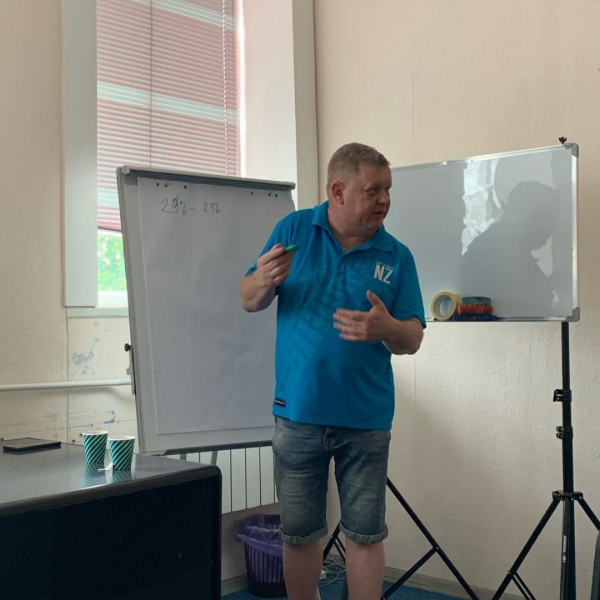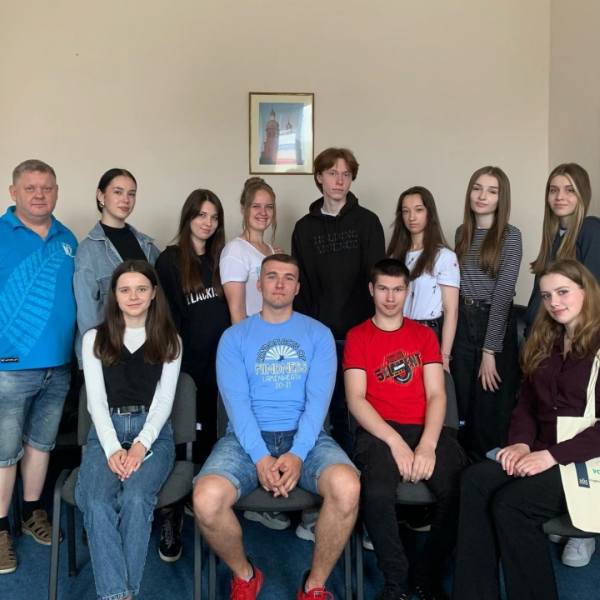A civil society initiative is helping to create a new generation of bloggers and vloggers in northeastern Ukraine who are fighting disinformation.
“The key thing about working with young people is to be genuine,” says Viktor Bobyrenko of the Bureau of Policy Analysis, a civil society organisation in Sumy in north-east Ukraine. “Young people are interested and motivated. They want to work with us because they want to gain more skills and practical experience. I value that.”
Viktor is the head of the Expert Group of the Bureau of Policy Analysis. Established 20 years ago, the Bureau is well-known for its anti-corruption work focusing on regional budgets, for holding local officials accountable and monitoring public spending. Today, as part of its work to counteract Russian narratives, it is engaging with young people to promote critical thinking and to help combat Russian disinformation through blogs and vlogs.
Life in wartime Sumy is very dangerous. The region has a 300-kilometre common border with Russia, and Sumy itself is just over an hour’s drive from the Russian border. The city was surrounded by the Russian troops in February and March of 2022, and many fled due to the threat of occupation. Today, Sumy remains under daily missile attacks.
Activism is notably low in the region and disinformation is prevalent, particularly in the context of the threat of military escalation. There is a particular lack of youth organisations in Sumy.
Viktor and his team have extensive experience of conducting analytical work on state and local policy programmes and budgets and of combatting disinformation. In recent times, they have worked on several projects for youth, including projects developing regional youth policy, and on creating myth debunking social media content.
The Bureau is now working closely with well-known bloggers and vloggers to create video content on inspirational locals, volunteers and family members of the military, helping to keep morale high.

“I’ve been working with young people for more than 30 years,” Viktor recalls, “First, I was a youth activist, then, the head of a youth organisation, and later, I headed the youth department in the Sumy regional administration. I know how to work with young people and I know the specifics of local government.”
“Our organisation used to focus solely on budget and anti-corruption measures. Then we began taking in interns from different universities, and many journalists and political scientists wanted to intern with us. That’s how we started training students,” he says
“We worked on budget analysis. We produced short videos about the budgets, their components, spending, and so on. We did investigations,” he says. Over the years the team built unique expertise on local budgets and local governance and worked closely with journalists on a number of key cases.
Now, thanks to an EED grant, the Bureau has been able to take this work a step further. Viktor is already among two members of the NGO ranked as among the top three most popular activists and bloggers in the city. Now he and his colleagues are working with well-known bloggers and vloggers to provide training to young people on producing high quality content that can help address social and political concerns, including disinformation, through social media.

“We have students from different fields: journalists, lawyers, political scientists, environmentalists. We teach them how to produce media content. I always recommend students to challenge themselves,” he says.
“We just made a short movie on restoration and rebuilding of our region - and how the budget money is being spent,” he says.
Other video footage includes an video on a young girl who helped rescue animals during the first month of Russia’s full-scale war against Ukraine, and another about a women embroiderer who teaches these traditional skills to young people, and another on Russian ‘shanson’ subculture – criminal songs. Some of the content gets more than a million views.
The EED grant has enabled the Bureau to open a space for students to learn how to become community-oriented bloggers. The interns spend months learning to operate a camera, record a video, and to explain local issues in a clear and concise manner. They are also trained in interpreting local budgets and spending.
“Young people come very well prepared and understand media concepts quite well,” Viktor says, “At the same time, they often fear the microphone and have a hard time working with the camera, and we help them overcome that. We attract really motivated students, and we want to support them – that way, we can help strengthen our nation through future generations.”
Interns learn how to identify Russian disinformation, and to understand "government-speak" and messages from the local authorities, helping them to critically analyse data from the official sources. None of these young people had any experience in video production.
“EED's support was extremely timely,” Viktor says, “It came when we were ready to restart our work with young people. This support allowed us to gain a valuable experience of implementing projects during the war – and we were able to carry out this work despite the security situation.”
As the war continues, there are many challenges ahead. “The authorities are less accessible due to the war and there is less open data,” he says. “Officials don't communicate with the communities or they talk down to us. They claim they are shielding us by not disclosing certain information. However, the effect is the opposite and it adds to the collective trauma of the war.”
This initiative was supported thanks to the contribution of the European Commission to EED.
This article reflects the views of the grantees featured and does not necessarily represent the official opinion of the EED.